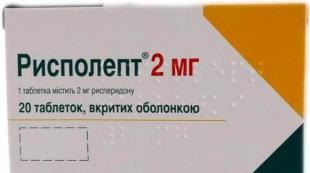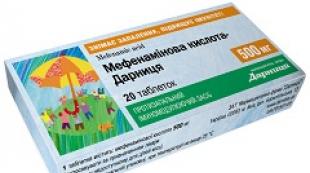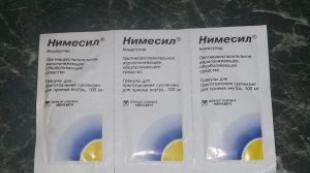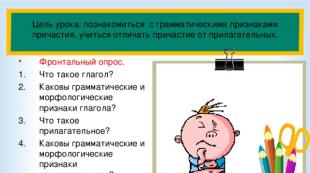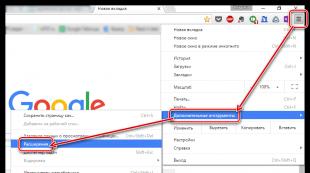Blocks one nostril while lying down. How to get rid of nasal congestion in a horizontal position. Penetration of a foreign body into the nasal passage
Statistical data assures that there is not a single person in the world who does not have a stuffy nose when lying down. This disease unpleasant in itself, and is also accompanied by headaches, cognitive disorders, and insomnia. The symptom may intensify over time and cause complications, and patients do not understand the essence of the pathological process happening to them. To answer their common question about when I go to bed, we should analyze the etiopathogenetic aspects of the non-standard condition.
Etiology of the symptom
In fact, more than one reason can lead to a condition where breathing is difficult during night sleep:
- First of all, the allergic nature of the symptom should be excluded. Many patients do not immediately agree with this option, since Everyday life expressed clinical manifestations hypersensitivity They did not note any reagents. However, allergies to pillow dust, mites and other insects living in them may not be noticed. It occurs hidden and intensifies during sleep, when breathing becomes rarer and more superficial. To eliminate nighttime nasal congestion, it is important not only to carry out antihistamine therapy, but also to eliminate a possible encounter with the antigen.
- Nasal congestion at night can be a consequence of low air humidity in the room where a person sleeps. Lack of ventilation in the cold season, constant operation of the heater makes the air in living rooms dry and waterless, which significantly dries out the nasal mucosa. This gives the feeling of being unable to breathe. The problem can be eliminated by purchasing an air humidifier - a special device that supplies water vapor to the environment. IN as a last resort, you can humidify the air by placing damp cloths on a radiator or heater. Banal ventilation of all rooms in the home is also useful.
- The nose gets blocked when lying down and with this disease, as it does not allow the secretions of the nasal passages to flow to the larynx. The special horizontal position of the head during sleep increases the lack of moisture; all the secretions are blocked by the inflamed organs.
Differential diagnosis of problems, why the nose cannot breathe, should only be carried out by a doctor. The main thing in this case is to identify the presence or absence of the disease, and then engage in everyday changes in conditions and traditional methods of therapy.
Pathogenetic aspects
The nose can become stuffy in various situations:
- When moving from the street, where there is cold or frosty air, into a warm room.
- Some patients experience difficulty breathing when looking at bright light.
- Inhalation cigarette smoke also causes inability to breathe.
- Alcohol intoxication can also disrupt the controlling effect of the control centers of the brain on breathing through the nose.
Most often, a stuffy nose accompanies those situations when the patient needs to lie down or go into a horizontal state. At the same time, blood flow to the olfactory organ increases, pressure in capillary network grows, which causes the plasma to sweat and form an edematous mucous membrane. The smallest diameter has the lower nasal passage, which, against the background of inflammation, blocks the air flow. So the patient feels that he cannot breathe through his nose and switches to breathing through his mouth. Returning to an upright position eliminates this problem and makes breathing more efficient and smooth.
In conditions infectious lesion sinuses, mucociliary clearance of the nasal passages is so difficult that it reacts to the slightest irritants. In particular, as soon as the patient manages to lie down, neurovegetative processes cause swelling to increase and block nasal breathing.
What to do
Sometimes patients do not want to see a doctor with such a simple complaint as it seems to them. night congestion nose In fact, in this case, the help of a specialist is needed, since the problem may get worse and not go away on its own.
After determining the cause pathological condition treatment may be very basic. The doctor may recommend:
- resort to foot baths or contrasting souls who have reflex action. Warm baths allow blood to concentrate in the lower half of the body and reduce blood flow in the head and neck area. The contrasting effect of water strengthens vascular walls, which may subsequently become more resistant to the development of edema.
- The reflex action of massage also helps well. You can resort to it as soon as you feel a feeling of nasal congestion at night: rub the bridge of your nose, the sinus area with a warming balm or ointment.
- Some clear nasal cavity Inhalation in combination with rinsing the nasal passages helps to remove swelling. The most gentle effect on the delicate nasal mucosa will be provided by a weak solution of sea salt or chamomile flowers, which can be used for each of the procedures. They fight the main symptom of inflammation - swelling, effectively moisturize the mucous membrane, and relieve itching.

Otolaryngologists are somewhat skeptical about nasal sprays. Their effectiveness leaves no doubt, however, to relieve each new episode of nasal congestion, an increasing volume of product is required and the frequency of irrigation increases. Finally, this drug addiction causes the drug to become ineffective.
Nighttime nasal congestion while lying down is not recommended to be ignored. long time. For a good prognosis, you need to visit outpatient doctor, and, if necessary, others narrow specialists: otorhinolaryngologist, allergist, maxillofacial surgeon. Comprehensive examination localizes with high accuracy pathological process, which will allow you to select the most effective therapy with rapid development clinical action and no side effects.
Nose is an organ respiratory system, performing two main functions - smell and protection. The inhaled air in the nasal cavity is moistened, warmed and cleared of germs, dust and other exogenous substances that adversely affect the body. It happens that a person cannot breathe through one nostril. This problem complicates life: discomfort occurs, sleep becomes restless, and the sense of smell is lost. Persons suffering from unilateral nasal congestion begin to breathe through their mouths, which negatively affects their general condition body. Upper mucosa respiratory tract Over time, it dries out and becomes inflamed, and pharyngitis, bronchitis, and laryngitis develop. Constant discomfort exhausts patients. They try to find a way out of the current situation by trying various ways combat the problem that has arisen.
Currently there are effective methods treatment of nasal diseases manifested by congestion. The modern pharmaceutical industry produces great amount medications, facilitating nasal breathing. Don't forget about folk methods treatment.
Etiology and symptoms
To return free breathing through the nose, it is necessary to determine the cause of this problem.
Among etiological factors congestion in one nostril, the most common are: colds, inflammation of the maxillary sinus, deviated nasal septum, vasomotor and allergic rhinitis, polyps, cysts, adenoids, tumors.


inflammation of the maxillary sinus

Diagnostics

An ENT specialist is involved in the diagnosis and treatment of unilateral nasal congestion. He examines the patient, identifies the cause of the pathology and prescribes appropriate treatment.
Diagnostic measures for nasal congestion:
- Examination of the nasal cavity using a light reflector,
- Rhinoscopy,
- X-ray paranasal sinuses nose,
- Computed tomography of the head,
- Laboratory diagnostics - biochemical, general clinical analysis blood and urine
- Allergy testing,
- Microbiological examination of nasal discharge and pharynx for microflora.
Traditional medicine
Drug therapy carried out by an otorhinolaryngologist consists of the use of the following drugs:

Surgical treatment is indicated for abnormalities in the shape of the nasal septum. To correct such a defect, they carry out. Any neoplasms in the nasal cavity: polyps, tumors, cysts must be removed. Abnormal growth blood vessels and adenoids in children also requires surgical intervention.
Currently, specialists soften nasal cartilage with a laser. This method is more gentle than surgery. Laser therapy can only modify the position of the cartilage. The nasal septum will remain crooked and will continue to have poor air flow.
ethnoscience
Traditional methods of treatment will help improve nasal breathing and eliminate nasal congestion.
- Instilled into a nostril that is breathing poorly chamomile or fennel extract.
- The nasal passages are cleared by rinsing your nose with salt water.
- The sinuses are warmed up boiled egg.
- Drops made from aloe juice, onion, garlic, Kalanchoe, carrot juice, honey. These are natural medicinal products should be diluted with water before use.
- Valerian root infused with olive oil, - very good folk remedy, relieving nasal congestion. Instill the medicine in the evening before going to bed into a blocked nostril.
- Lubricate the nasal mucosa at night lamb fat using a match and cotton wool. After 2-3 uses, breathing through your nose will become much easier.
- If nasal congestion is due to a cold, treatment is recommended inhalations. The easiest way is to breathe over boiled potatoes, covered with a blanket.
- Simple self-massage helps get rid of nasal congestion. The wings of the nose are massaged with two fingers for a minute, making circular movements. Periodically tap the bridge of the nose.
- The jar is filled with chopped onions and garlic. When nasal congestion reaches its maximum, open the jar and take a deep breath.
Video: why your nose can’t breathe in the program “Live Healthy!”
Question: Hello, Sergei Vadimovich!
In February 2017, after ARVI, in within three The nasal congestion did not go away for weeks, then it partially went away and began to appear only nasal congestion while lying down on the side, blocking the half of the nose on which side it was lying.
I also began to constantly sniffle, because mucus did not flow from my nose, but seemed to accumulate in the depths of the nasopharynx.
In the fall of 2017, I fell ill again, this time without a runny nose, and turned to an ENT doctor who diagnosed vasomotor rhinitis and prescribed the hormonal spray Tafen Nasal, which did not help at all to get rid of nasal congestion while lying down.
In January 2018, I caught a cold again. The disease proceeded without an increase in body temperature. Appeared severe runny nose and congestion. He recovered within a week. Polydexa and Tafen Nasal were prescribed for treatment of rhinitis.
In mid-February I fell ill again, this time with a fever. The hormonal nasal spray Polydexa no longer relieved congestion, so they were prescribed vasoconstrictor drops Tizin and Tafen Nazal. They cured congestion during the day in a week.
It is important to clarify that nasal congestion was cured that was bothering in daytime, and congestion nasal congestion while lying down– the nostrils on the side I was lying on and the formation of mucus flowing into my throat remained with me. This means that some of the inflammation remains.
In order to cure this too, instead of Tafen Nazal was prescribed hormonal spray Nasonex- also without positive effect in treatment.
At the end of February, a feeling of pressure appeared in the depths of the nose and a feeling of pressure on the bridge of the nose.
It should be noted that I have a deviated nasal septum. However, previously I rarely had a cold; until February 2017, I had not had a cold for two years. In addition, a deviated nasal septum does not in any way affect breathing through the nose. Both nostrils breathe equally well after physical activity or vasoconstrictor drugs.
At the end of March I did MSCT (multispiral CT scan), I am attaching the protocol. The study was carried out in two projections.
The following is a long description of the condition frontal sinus and ethmoid bone without fluid levels. Condition of the maxillary sinus. In the right maxillary sinus small cyst, measuring five by four millimeters. High localization of tooth roots. The nasal septum is curved to the left and has a spike-like deformation to the left. Condition of the mucous membrane of the nasal concha.
Bullous transformation of the mucous membrane of the middle turbinate is also indicated, symmetrically on both sides. (how does this affect nasal congestion while lying down?)
Regarding the cyst, the ENT surgeon said that it does not interfere at all and therefore there is no point in operating on it, but it needs to be corrected nasal septum and trim the shells, since the vasomotor regulation of the mucous membrane depends on them.
In early April, I went to an ENT doctor. The doctor prescribed me homeopathic Teucrium 6C - take three granules once a day for six months. He told me to come for an appointment at the end of October.
At the end of May I had a sore throat. Recovery was within a couple of days. After this, nasal congestion appeared during the daytime. I finished it in two days Avamis hormonal spray.
After 5 days of treatment with this spray, I found that I almost always woke up from sleep with a normally breathing nose, both nostrils breathing well. True, not always, but even if I slept with one nostril blocked, the swelling subsided literally within a few seconds. I almost stopped sniffling.
However, in the second half of June, my congestion and feeling of pressure on the bridge of my nose and wings of my nose returned. I associate this condition with the abnormal heat in Moscow at this time. And here Avamis practically didn’t help; it certainly relieved the congestion during the day, but there was no way to restore breathing in the lower nostril at night.
On July 15, my nose began to get stuffy again, even on the street. Again I associate it with the abnormal heat in Moscow. I started spraying in my nose hormonal spray Nasonex. Within a few days, nasal breathing during the day returned to normal, but nasal congestion while lying down at the same level.
I have been accepting since April cold and hot shower, I do physical therapy - Darsonval, I use hormonal sprays. And all this can no longer restore normal nasal breathing.
Now my nose is stuffy in hot and stuffy rooms. It also blocks the lower nostril when lying on your side - after waking up, the swelling goes away only after a few minutes. If you do physical exercise– then the swelling will go away instantly.
In very hot weather, the mucous membrane in the nose may swell even during the day. Sometimes mucus accumulates in the nasopharynx and you have to sniffle. Sometimes there is a feeling of pressure in the depths of the nose and a feeling of pressure on the bridge of the nose and at the base of the left wing of the nose. When eating hot food, mucus forms in the nose.
And one more clarification. This winter, when the temperature was below zero, I started getting rhinorrhea outside. This is the first time. At the same time, the nose breathes perfectly in the cold.
Under a warm or hot shower, my left nostril begins to breathe perfectly, exactly the direction in which the septum is curved. And at the same time, the exact opposite situation with right side– the mucous membrane in the right nasal passage begins to swell, breathing through it is difficult.
Even if the left nostril was slightly blocked for some reason, it is guaranteed to open, and the right one will begin to block. It’s a strange feature, I don’t even know why this happens, but I decided to say about it. The left is better from heat, and the right is worse from heat.
During walks, sports, outdoors and fresh air the nose breathes very well.
To strengthen the treatment I’ve been doing it for a month now. breathing exercises Strelnikova, but special effect I don’t see, except that the amount of mucus in the nasopharynx is decreasing. Nasal congestion while lying down remains.
The regimen prescribed by the ENT doctor - Teucrium 6C - taking 3 granules once a day for six months does not help. 3.5 months have already passed and there is no effect. What to do, how to be treated?
Answer: Hello, Nikolay! The homeopathic drug Teucrium marum 6C () in your case will be close to a neutral drug. This is good medicine, I appreciate it, but it only partially takes into account yours and does not take into account modalities.
Are you aware that withdrawal syndrome exists? If you take something very strong that suppresses the disease like hormonal agent , That nasal congestion while lying down, swelling of the mucous membrane, or some kind of spasms, then after discontinuation of the hormonal drug, the disease can again make itself felt, but in a more severe form.
If you suppress the disease again, it becomes better again, but after the suppressive drug is removed, the disease inside intensifies even more. The remedy used becomes ineffective and you have to take something even stronger. And so on ad infinitum. homeopathic medicine to then continue treatment with it.
Question: Thank you very much! Tell me, approximately how long should we expect improvement in order to understand whether these drugs are suitable?
Answer: It is difficult to say in advance how quickly the body will react. Maybe in three days, or maybe in three weeks.
On average, if the dosage is appropriate, improvement may begin within a week. Or you need to strengthen the drugs.
Homeopath Grigor Sergey Vadimovich
Some people experience serious discomfort during the night, and this is due to nasal congestion. Most often, the nose “does not breathe” during the period of colds, during the cold season and regular “snot”. This is a symptom characteristic of ARVI, influenza, sinusitis, sinusitis, etc. But it happens that nasal congestion occurs for no reason, that is, a person does not have any problems with breathing through the nose during the day, does not experience a runny nose or other signs of a cold. But in the evening, when the body is in horizontal position, appears unpleasant feeling congestion.
Why my nose gets stuffy at night and how to get rid of it unpleasant symptom? To find a way to recovery, it is necessary to find out the main cause of swelling of the nasal mucosa.
Violation normal breathing negatively affects the quality of sleep. People suffering from this disease cannot sleep for a long time or wake up at regular intervals, but such sleep does not allow the body to fully rest and gain strength before a new working day.
Nasal congestion small child may provoke negative consequences. Due to lack of oxygen, a violation occurs respiratory rhythm, which negatively affects brain function. If this symptom is not eliminated in a timely manner, memory and mental development are likely to decline.
The nose may stop breathing before going to bed or already during sleep, while the person is in a lying position. The causes of this symptom are varied; experts agree that nasal congestion is a characteristic consequence of problems in the human body.
The most common cause of sinus swelling is inflammatory disease. As a rule, this symptom is accompanied by other signs of the ongoing disease: general weakness, fast fatiguability, sore throat, cough, hoarseness, heat bodies, etc. Colds eliminated with medications And traditional methods treatment. By completing a full wellness course, you can get rid of problems with nasal congestion when lying down.
With such manifestations, the issue of nasal congestion is resolved quickly, but what should a person do if he has a problem breathing through his nose in the evening, before bed, in the absence of snot? Many people complain that during the period of swelling of the mucous membranes of the organ, they feel a desire to clean the nasal sinuses, but this is not possible. Why does the nose get stuffy when lying down and how to treat it?
Causes of swelling of the mucous membranes in the absence of snot:
- an allergic reaction that appears only in the evening may be due to the proximity of an allergen (animal fur, pollen indoor plants etc.);
- hormonal disruptions in the body, which is especially typical during pregnancy;
- dry air in the room where a person goes to sleep;
- in the presence of mechanical damage nasal septum, which could have occurred as a result of injury;
- congenital deformation of the nose;
- the development of polyps in the nasal passage, making breathing difficult and evoking feelings congestion in the evening when a person is in a lying position;
- unfavorable ecology in the area of residence can also provoke the development of this symptom.

Sometimes the cause of swelling of the nasal mucosa is long-term use vasodilators for the treatment of runny nose. This often happens after past illness, during which a person often used drops to eliminate snot. Many pharmaceutical drugs They are highly addictive, which later manifests itself as sinus congestion.
This symptom, which appears in a small child in the absence of snot, is especially dangerous for the life and health of the growing organism. If parents notice difficulty breathing in their baby at night, they should immediately seek help from a competent specialist.
Why is sinus congestion dangerous?
If an adult or small child does not have snot, but the nose does not breathe during sleep, you should look for the probable cause of the development of swelling. If not taken timely measures, quite unpleasant complications may arise.
With nasal congestion caused by an allergic reaction, no special consequences can be expected, with the exception of lack of sleep and chronic fatigue from lack of a good night's rest.
If the swelling was caused by an infection that has settled in the nasal cavity, Great chance development of sinusitis, otitis, meningitis and even brain abscess. Such a person is a carrier of a potential infection, so treatment should be carried out in a closed infectious diseases hospital.
Does the child have no snot, but his nose does not breathe during sleep? This means it’s time to get examined by a pediatric ENT specialist. Most often, nasal congestion in children occurs due to congenital deformity partitions. Swelling of the mucous membrane respiratory organ a child may develop due to allergic reaction, and also due to infectious infection. To figure out exact reason and help the baby in this unpleasant problem, an experienced doctor will help after a detailed examination of the nasal sinuses.
Why doesn't the nose breathe during pregnancy?
A pregnant woman comes to a specialist with a complaint about lack of sleep: “as soon as I go to bed, my nose stops breathing, an unpleasant feeling of stuffiness sets in without a runny nose. Why does this happen and what to do in such a situation?” This question is quite relevant, and in this section of the article we will talk about probable reasons swelling of the nasal sinuses during pregnancy.

The main cause of nasal congestion that occurs during pregnancy is hormonal changes in the body of the expectant mother. Sometimes, this symptom indicates complications in the development of the intrauterine child, therefore, if a woman does not have a runny nose, but is not breathing through her nose, she should consult a doctor about this problem. Only after examining the nasal sinuses of a pregnant patient will the doctor be able to identify the real reason congestion and prescribe appropriate treatment procedures: taking safe medicines or physical therapy.
If swelling develops during pregnancy, caused by dry indoor air, experts recommend ventilating the bedroom as often as possible. A special humidifier is also effective.
If the nose does not breathe for a reason chronic runny nose, the use of synthetic sprays and drops during pregnancy is not recommended. You can free your nose from this unpleasant symptom using safe traditional methods of treatment. Ordinary boiled water diluted with salt is an effective solution for eliminating swelling of the nasal sinuses!
You can get rid of unpleasant nasal congestion during pregnancy with the help of inhalation procedures. Excellent results shows chamomile treatment.
With nasal congestion there may or may not be snot. Stuffy nose when lying down at night if a person is sick chronic rhinitis or sinusitis. In addition, the nose gets stuffy when lying down due to anatomical structure nasal passages or the presence of neoplasms such as polyps, cysts.
If it is impossible to breathe through your nose only at night, then this may be an allergic response of the body to dust mites that live on bedding. Many people are allergic to poultry down. An allergist will help determine the cause. external stimulus by skin tests or a blood test from a vein. Once the allergen has been identified, it must be removed from the home. For example, change down pillows to synthetic hypoallergenic materials, and remove mites with special disinfectants. It is important to carry out wet cleaning in the house.
Many people are interested in the question: “Why does the nose get stuffy when lying down?” While a person is walking, the nose breathes well, but as soon as he lies down there is swelling. Common reason- this is dry indoor air, especially in winter when the heating is on. In such a situation, children's noses suffer greatly. The solution to the problem is simple: you need to buy an air humidifier and control the level of humidity in the room. Even ordinary improvised means, such as sprinklers, will help. They can be given to children, and they will independently humidify the children's room.
Stuffy nose without runny nose when lying down; disease" Chronic sinusitis", but then the patient suffers from a dry cough. In such a situation, you should contact an ENT specialist who will prescribe adequate treatment. A person who has had sinusitis will experience nasal congestion at night for some time.

Nasal congestion is a reaction of the body that should not be brushed aside, but is important to treat. At allergic rhinitis the nose breathes well if a person is in vertical position, but as soon as he lies down to rest, his nose immediately stops functioning. How dangerous is this phenomenon for health? If the nose is constantly stuffy during sleep, this leads to quality sleep, the consequence is nervousness, irritation, constant fatigue and depression. This cannot be allowed to happen.
The nose may stop breathing at night if an infection has entered the passage. It leads to the development of otitis media, meningitis and brain abscess. This infection can be transmitted from a patient to healthy person, therefore dangerous for others.
If a child has problems with the nose, it is much more difficult to identify them, since the baby cannot explain what is bothering him. The first signs of a problem with the olfactory organ are snoring in a horizontal position, an open mouth in sleep, sniffling, scratching the nasal passages, sleep disturbance, and tearfulness. A deviated nasal septum leads to difficulty breathing in the child. It is treated through surgery.

Breathing poorly baby nose with the growth of adenoids. They block the nasal passages by two-thirds, and in a horizontal position they close due to swelling. Medicines are prescribed to relieve swelling, and if they do not help and the child continues to have trouble breathing, the adenoids are cut out. An ENT specialist can prescribe various “Cuckoo” rinses.
To treat nasal congestion, doctors prescribe vasoconstrictor drops. They help the patient at first. Such substances for the nose can be dripped for a maximum of a week. But the patient often forgets about the boundaries of the disease and drips them for some time, because they help. Is not correct treatment, because these drops thin the nasal mucosa and disrupt its microflora. As a result, problems begin to become even more serious than before.
Pregnant women also suffer from nasal congestion, especially in winter. They may be bothered by either a profuse nasal discharge or difficulty breathing. This happens due to changes hormonal levels. The gynecologist will recommend safe drops to alleviate the condition. It is important to listen to him, because a lack of oxygen will lead to fetal hypoxia. If the drops do not help, physiotherapeutic treatment is prescribed.
When a person suffers from nasal congestion, it is enough for him to increase the amount of fluid he consumes. Inhalations with chamomile or saline, rinsing the nose with a solution of sea salt. Cigarette smoke also makes breathing difficult, so you should avoid places where people smoke.
Allergies in an adult or child are treated antihistamines, such as "Alerzin", "El-Tset", "Aleron" and others. It is enough to drink the drug and your nose will breathe fully again. If a child puts a foreign body in the nose, breathing will be difficult. You need to call immediately ambulance. It is important to monitor your health and the health of your children, and then no runny nose will be an obstacle to good rest and the game.

